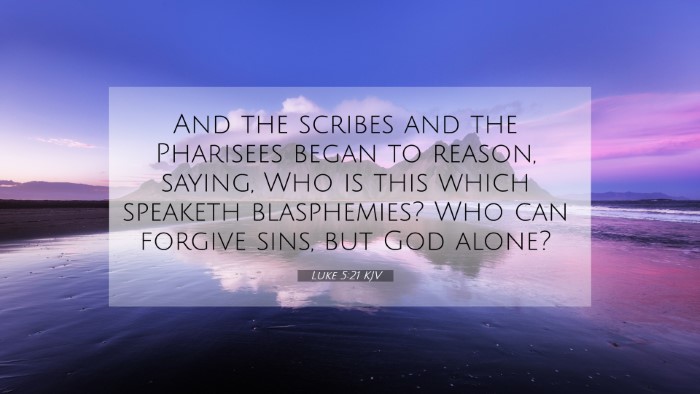Understanding Luke 5:21
Verse Reference: Luke 5:21
Bible Verse: "And the scribes and the Pharisees began to reason, saying, Who is this which speaketh blasphemies? Who can forgive sins, but God alone?"
Summary of Luke 5:21
This verse captures a critical moment where Jesus is confronted by the religious leaders of His time, the scribes and Pharisees. They perceive His declaration of forgiveness for sins as blasphemy, firmly believing that only God has the authority to forgive. This reflects not only their misunderstanding of Jesus' divine nature but also sets the stage for the unfolding of Jesus' ministry and His divine mission.
Interpretative Insights
Matthew Henry's Commentary: Henry explains that the Pharisees’ reasoning highlights their hardened hearts and legalistic views. They fail to recognize the authority and divinity of Christ and thus cannot accept His actions. Their accusation of blasphemy arises from a lack of spiritual discernment and knowledge of who Jesus truly is.
Albert Barnes' Commentary: Barnes emphasizes the tension between Jesus and the religious authorities, noting that their challenge illustrates the greater conflict between grace and law. The Pharisees, as guardians of the law, viewed Jesus’ claim to forgive as overstepping divine prerogative, demonstrating their inability to comprehend God's mercy manifest in Christ.
Adam Clarke's Commentary: Clarke adds that this verse signifies the deep-seated belief among the Jewish leaders that God alone possesses the right to forgive sins. He points out that their inability to accept Jesus as the Messiah leads to spiritual blindness, and their misunderstanding serves a larger narrative of rejection confronting Jesus throughout His ministry.
Connections between Bible Verses
Related Bible Verse Cross-References
- Isaiah 43:25 - God speaks of His ability to blot out transgressions.
- Mark 2:7 - Shares the Pharisees' question about blasphemy in response to Jesus’ forgiveness of sins.
- Romans 3:23-24 - Discusses sin and the justification found through the grace of God.
- John 10:33 - The Jews accuse Jesus of blasphemy for claiming to be God.
- Luke 7:48-49 - Jesus forgives a sinful woman, eliciting a similar reaction from the Pharisees.
- Matthew 9:3 - Another account where Jesus forgives sins, stirring outrage among the religious leaders.
- Psalms 103:12 - Affirms God's power to forgive and remove sins as far as the east is from the west.
Thematic Bible Verse Connections
The themes of authority, forgiveness, and the nature of Christ surface repeatedly in the scriptures. As we examine Luke 5:21, we observe the profound implications of Jesus’ claim to forgive sins and the backlash it generates from the religious authorities.
- Authority of Christ: Jesus' authority to forgive establishes a foundation for understanding His divine nature.
- Forgiveness: The principle that forgiveness is central to Jesus’ mission is echoed across the New Testament.
- Rejection of Christ: The rejection faced by Jesus exemplifies the broader narrative of disbelief surrounding His teachings and acts.
Cross-Referencing Bible Study: Tools and Methods
For a deeper understanding of interconnected scriptures, consider these approaches:
- Bible Concordance: Utilize a concordance to find verses related to key terms such as 'forgiveness' and 'blasphemy.'
- Bible Cross-Reference Guide: Use guides that compile cross-references to enhance your study of similar themes.
- Comparative Bible Verse Analysis: Compare accounts in the Gospels to see how each writer illustrates Jesus’ acts and reactions differently.
Concluding Thoughts
Luke 5:21 not only reveals the initial conflict between Christ and the religious leaders but also sets an important precedent for understanding the heart of Jesus’ mission: to bring forgiveness and reconciliation between God and humanity. Through the insights from various commentaries, it becomes clear that this single verse illuminates broader themes and issues that resonate throughout the entire Bible, thereby enriching any study focused on Bible verse parallels and thematic relationships.























